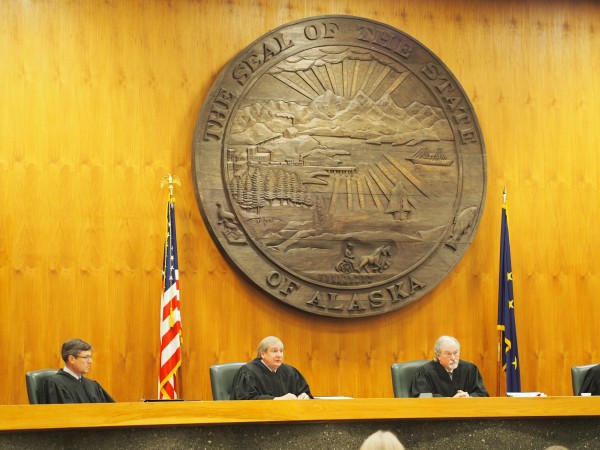The Alaska Supreme Court heard oral arguments today in case that could upend the way the state pays for education. The Ketchikan Gateway Borough is arguing that it’s a violation of the state constitution to require local governments to chip in money to fund local schools. Particularly when there are small communities throughout rural Alaska that aren’t required to provide any local contributions. KSKA’s Zachariah Hughes was in court today, and says the legal dispute hovers over what counts as a dedicated fund.

TOWNSEND: Zach, why does the Ketchikan Gateway Borough say that the states mandatory minimum funding requirements are unconstitutional?
HUGHES: So to get what the borough is getting at, you have to go back to what dedicated funds mean in Alaska, and thats sort of a holdover from when the territorial laws crossed over into the constitution that we now have.
That was in the 50s and 60s and there were these consultants brought in to kind of help design the state constitution and one of the things they were worried about were dedicated funds that states like New Jersey put towards highways and some other stuff like that and basically it ended up giving small bureaucracies a lot of control in ways that legislatures didn’t really want to have happen.
So there’s this big thing in Alaska anyone who’s familiar with local government has heard complaints about (you’re) not able to dedicate funds, you’re not able to earmark funds, everything just has to go into the same general fund when it comes to state money.
Now, what the borough is saying is that by asking to local governments, like the Ketchikan Gateway Borough, to fund education at a minimum level that that amounts to a dedicated fund, right, it’s an indirect dedicated fund. The argument that the borough is making is that the legislature has kind of squeaked its way in to being able to guide funds towards education in a way that’s unconstitutional.
TOWNSEND: Both sides are citing different legal precedence, but the states argument to the Supreme Court says local contributions are not a dedicated fund, that in fact that they’ve long been a way to promote local buy in, what case is the state making there?
HUGHES: The case that the state’s making, and you’re right to say there’s a lot of different precedence flying back, I am not a legal scholar so keeping track of all the different moving parts on this had been a challenge in its own right.
If I understand the states case correctly what they’re saying is look this isn’t a dedicated fund in fact most of the boroughs and local governments, including the Ketchikan Gateway Borough, fund education above the mandatory minimums required by the state, Ketchikan’s required to pay about $4 million in their local contribution, the year under dispute in this case they paid $7 million which means they raised their own minimum numbers because they think education is that important its beyond the minimum.
The State is saying not only do they feel that way, most feel that way and we have a great system in Alaska that requires local buy in right, local governments and the communities they’re in have to decide not only whats the minimum but what do we want to have? And instead of it just being just a state school, the community has some say and some leeway in determining program.
An example that the states attorney Kate Vogel brought up, was the case of the North Slope Borough, where theres an Iñupiat curriculum thats taught there, that’s overseen by the state but it’s done in accordance, thats kind of one of those ways by asking a local government to be a partner to pony up funds they’re actually making sure there is some presence and some commitment from the local communities.”
LORI: What’s at stake in this ruling? It could be anywhere from a few months to two years before the justices give a ruling, what are the implications of this decision?
HUGHES: Lori, the short answer is we don’t really know and I hate offering that but in this case its a really, really, really good and important answer that I’ve heard from a lot of people that are watching this case really closely. Basically this is the way the state has funded its education system in one way or another with some modifications since Alaska was a state.
If the Ketchikan Gateway Borough wins this case it’ll mean we have to completely redesign how the state pays for education and instead of there being any one outcome that anyone knows will happen “oh the state will just step in and fill in the gap that remains” This has such broad implications that its likely it would go before the legislature to redesign the system as it stands. For some people, particularly for those watching rural schools, that’s a dicey proposition because the state is kinda broke. But the short answer is we really don’t know, this is a huge case with some really big implications for years to come across the state.
Lori Townsend is the chief editor, senior vice president of journalism and senior host for Alaska Public Media. You can send her news tips and program ideas for Talk of Alaska and Alaska Insight at ltownsend@alaskapublic.org or call 907-550-8452. Read more about Lori here.





